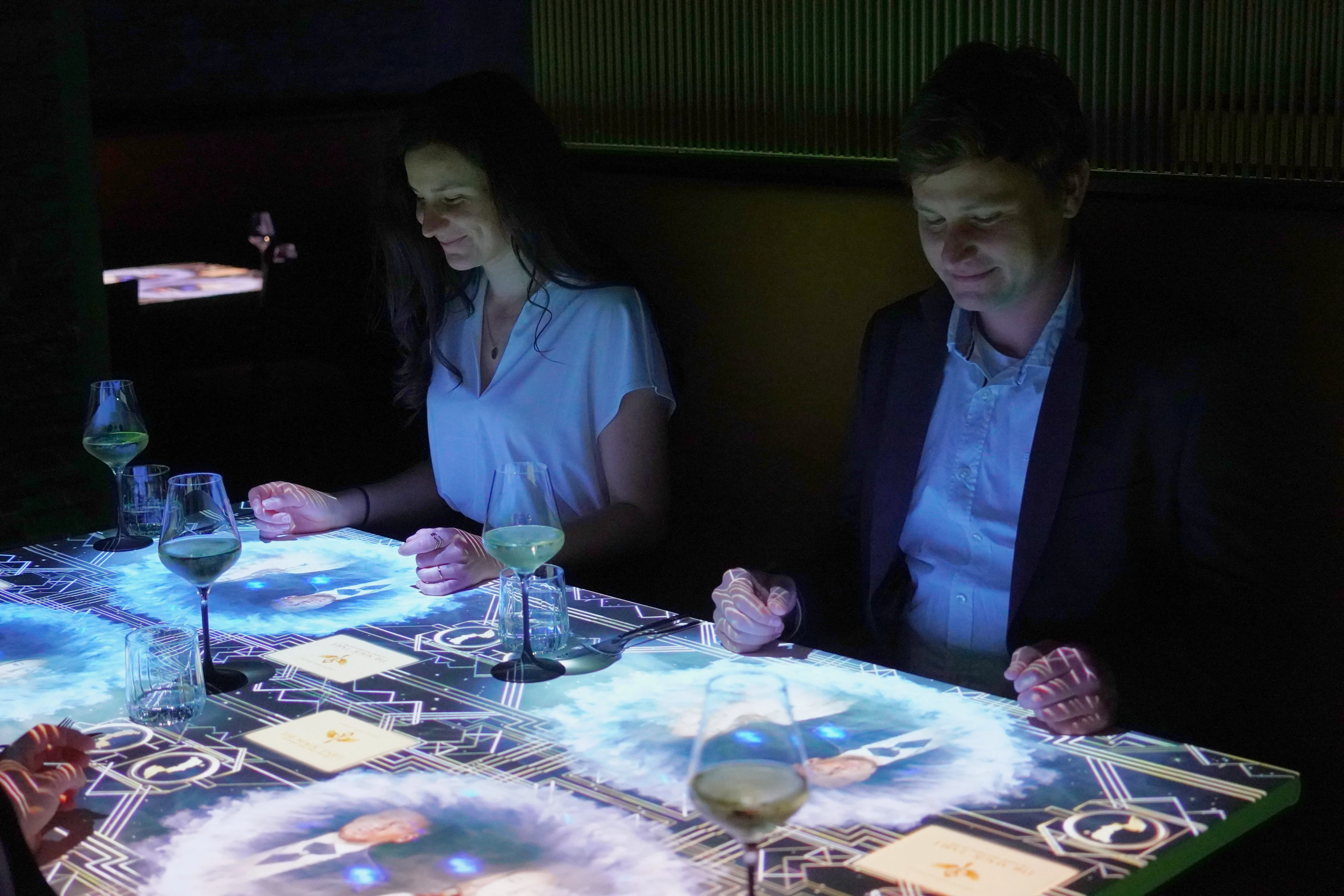By Victoria Burrows
Copyright scmp

Guests sitting down for dinner at The Residence at the Grand Hyatt Hong Kong will find that their tabletop has been turned into a visual spectacle. A virtual story is projected onto the table, with optical techniques and length distortions creating the illusion of depth and a 3D effect.
The interactive, immersive dining experience, called The Magic Table, is the global premiere of a new show by two stars of America’s Got Talent, Thommy Ten and Amélie van Tass, who perform as The Clairvoyants. Taking place from Wednesday through Sunday, with two shows per evening, the experiential dinner is the second of its kind at the Grand Hyatt. The immersive experience follows on from February’s Le Petit Chef, in which a miniature chef projected onto tables interacted with dishes.
These technology-meets-dining storytelling events are just two of a wider range of unusual experiential options in the city this year. Hongkongers have also had the opportunity to sit down for dinner in pitch-black darkness, enjoy dishes paired with live opera, and attend a daytime rave serving salted dried plum and cherry tomato coffee.
This trend raises the question: what happened to just meeting at a coffee shop or going out for a meal with good food, good wine and good conversation? In a city known for flaunting expensive wines and luxury ingredients, have we shifted to showing off with exclusive experiences?
At a time when many restaurants are struggling to fill seats, the organisers of these unique events say they are highly successful.
In late May, The Peninsula Hong Kong debuted Les Amours de Carmen Wong, in partnership with the French May Arts Festival, at its European fine-dining restaurant, Felix. The opera reinterpreted Bizet’s Carmen in the context of 1960s and 70s Hong Kong, while a dinner menu was created to complement the performance. The hotel went on to arrange another two evenings, on July 21 and September 20, at French haute cuisine stalwart Gaddi’s and Felix respectively.
Eric Poon, director of sales and marketing at The Peninsula Hong Kong, says the programme – which aimed to blend heritage, art and gastronomy – was “met with tremendous enthusiasm”.
“We wanted to bring opera out of traditional theatres and into an unexpected setting, making it feel alive and accessible. The menu was designed to echo the work’s intensity, passion and romance,” he says. “Guests told us that they felt immersed in a story that unfolded around them.”
The success of such events hinges on the fact that good food and wine – or coffee – have not been sacrificed. Instead, gastronomy has become part of a bigger experience.
For the performance at Gaddi’s, the four-course menu by chef de cuisine Anne-Sophie Nicolas included beef tartare with Baerii caviar, capers and quail eggs; wild sea bass with beluga caviar; and Miéral pigeon with green peas and girolle mushrooms. At Felix, chef de cuisine Aurélie Altemaire’s dishes included caviar with ricotta-spinach ravioli and warm lemon mayonnaise; and a Felix Opera dessert made with coffee cream, chocolate ganache and cardamom ice cream.
The idea was that the flavours, textures and visuals work in harmony with the unfolding performance, amplifying the emotional heights of the evening
Eric Poon, The Peninsula
“We began by identifying the themes and emotions of Carmen Wong – passion, drama and fate – and translated these into the choice of seasonal ingredients and culinary techniques. The plating aimed to evoke the colour and rhythm of the story,” explains Poon. “The idea was that the flavours, textures and visuals work in harmony with the unfolding performance, amplifying the emotional heights of the evening.”
Indeed, emotions are crucial to the experience, says Poon. “In a climate of challenges, from rising costs to evolving guest expectations, the key lies in creating authentic connections and building emotional bonds. Guests return not only for cuisine of the highest calibre, but also for the stories, emotions and memories that come with it.”
Food and experience designer Alison Tan creates unusual, at times provocative, pop-up dinners and events across the city. She says, “People love to step outside their comfort zone. They feel so proud when they’ve done something out of their normal routine.”
Food, she adds, is an ideal conduit: “There’s not a single person for whom food doesn’t hold emotional weight.”
The emotional response of guests also matters at Dans le Noir? (In the Dark?), an experience at Le Méridien Hong Kong, Cyberport, in which diners sit in complete darkness and are served their meal by visually impaired staff. Social connection is important too.
“This unique concept encourages patrons to engage their senses beyond sight, fostering a deeper appreciation of food and the dining experience,” says Daniel McKeown, the hotel’s general manager. “By partnering with visually impaired guides, we also promote inclusivity and awareness, allowing guests to connect with the community in a meaningful way. It’s about creating unforgettable moments that challenge perceptions and enhance social interactions.”
Paris-based Dans le Noir? was founded in 2004 and has since welcomed more than 3 million participants worldwide. After McKeown and his team read up on the concept, he reached out to suggest a collaboration.
Setting up was not without its challenges, however: Le Méridien had to come up with engineering solutions to ensure complete darkness in the dining area, and as the set-up is mobile, staff have to dismantle and reinstall the dark room every week. McKeown worked with local organisations to hire visually impaired staff and ensure they receive comprehensive training for the event.
Guests are served a surprise tasting menu specially created by executive sous chef Jacky Chui. With the programme running until the end of the year, the menu changes every few months to keep things “fresh and exciting” for repeat guests, who may bring different companions.
The culinary team aims to create dishes that surprise and challenge taste perceptions by offering different textures – from crispy to chewy to creamy – and bold, complex flavours.
Some ingredients have been outlawed, however – anything too spicy; exotic foods that could be unfamiliar or too challenging; and flavours that may not appeal to a broad audience. The team responds to guest feedback and preferences, tweaking the menu accordingly.
“The goal is to create a harmonious dining experience that invites exploration and curiosity, and is a sensory adventure,” says McKeown.
An adventure in darkness cannot, however, be captured for social media. Recognising the modality’s power as a marketing tool, the hotel invited celebrities, key opinion leaders and food enthusiasts to experience dining in the dark, and take photos before and after their meal at a photo booth area.
Social media is essential when it comes to East Hong Kong’s pop-up with No Coffee from Fukuoka, Japan, running until the end of November. No Coffee was established in 2015 by Shinsuke Sato, a former fashion designer, and gained a following for promoting good coffee as a lifestyle through collaborations with contemporary fashion, accessory and design brands.
The pop-up at East Hong Kong is offering special drinks including No Coffee’s signature black latte; nitrogen-infused teas and coffees; and a boozy banana and pandan-leaf coffee which is spiked with shochu. Merchandise, including No Coffee x East T-shirts and coffee-making paraphernalia is also on sale.
To launch the event, the hotel held a coffee rave on September 7 at cafe and co-working space Domain. DJ Seth Gutierrez performed, while local tattoo-culture platform TattooSays gave guests non-permanent tattoos of No Coffee’s canine mascot.
Eddie Pang, the hotel’s director of restaurants and bars, says tickets sold out fast. Local celebrities attended, and one guest even flew in from Tokyo to buy a T-shirt and meet Sato.
“We aimed to create an event that was unique and tapped into current trends,” Pang says. “We targeted under-35s using Instagram and Threads. Social media is especially important for crossover events with international brands to build awareness.”
Pangs adds that he sees a clear, wider shift from a “product” economy to an “experience” economy: “People are looking for the whole experience.”
For all the gimmicks involved, the core of this trend remains fundamentally human: a craving for connection. These experiences succeed because they transform a meal from passive consumption into active participation. And as long as we desire to be moved, surprised and connected, experiential dining is here to stay.



